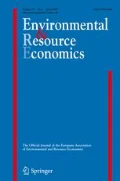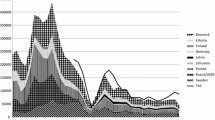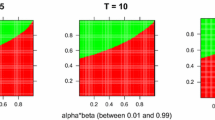Abstract
This paper surveys the application of game theory to the economic analysis of international fisheries agreements. The relevance of this study comes not only from the existence of a vast literature on the topic but especially from the specific features of these agreements. The emphasis of the survey is on coalition games, an approach that has become prominent in the fisheries economics literature over the last decade. It is shown that coalition games were first applied to international fisheries agreements in the late 1990s addressing cooperative issues under the framework of characteristic function games. Then, progressively, this cooperative approach was combined with non-cooperative elements such as the stability analysis of the agreements. Finally, partition function games, which model coalition formation endogenously, were introduced and became the standard approach to study the formation and stability of international fisheries agreements. A key message that emerges from this literature strand is that self-enforcing cooperative management of internationally shared fish stocks is generally difficult to achieve. Hence, the international legal framework and regulations play a decisive role on ensuring cooperation over the use of these resources.
Similar content being viewed by others
Notes
Hereafter, these stocks will be simply referred as internationally shared fish stocks. Thus, our analysis is restricted to marine capture fish stocks, which are by far the most important internationally shared fish resources. The main principles discussed also apply generally to shared inland water fisheries.
This broad category includes what, in the terminology of the Food and Agriculture Organization of the United Nations, is called highly migratory fish stocks, such as the main tuna species. According to Munro (2007), there is no meaningful difference between straddling fish stocks and highly migratory fish stocks as far as economic analysis is concerned.
The number of sub-coalitions, \(2^{n}\), also includes the empty coalition (Ø) and the grand coalition.
In addition to the \(\upgamma \)-characteristic functions there are the \(\upalpha \)- and ß-characteristic functions, which presume strategies to make the other players worse off.
Finus (2003) also concludes that for the standard models on the formation of International Environmental Agreements (IEAs) the equilibrium coalition size and global welfare are at least as high under the Stackelberg than under the Nash-Cournot assumption, due to the strategic advantage of participants over non-participants.
Thus whenever cooperation would be needed most, it achieves only little. This paradox was first described in the context of International Environmental Agreements by Barrett (1994).
References
Arnason R, Magnusson G, Agnarsson S (2000) The Norwegian spring-spawning Herring fishery: a stylized game model. Mar Resour Econ 15:293–319
Bailey M, Sumaila UR, Lindroos M (2010) Application of game theory to fisheries over three decades. Fish Res 102:1–8
Barrett S (1994) Self-enforcing international environmental agreements. Oxford Econ Pap 46:878–894
Barrett S (2003) Environment and statecraft: the strategy of environmental treaty-making. Oxford University Press, New York
Bjørndal T, Munro G (2003) The management of high seas fisheries resources and the implementation of the UN Fish Stocks Agreement of 1995. In: Folmer H, Tietenberg T (eds) The international yearbook of environmental and resource economics 2003/2004. Edward Elgar, Cheltenham, pp 1–30
Bloch F (1996) Sequential formation of coalitions in games with externalities and fixed payoff division. Games Econ Behav 14:90–123
Bloch F (2003) Non-cooperative models of coalition formation in games with spillovers. In: Carraro C (ed) The endogenous formation of economic coalitions. Edward Elgar, Cheltenham, pp 35–79
Brandt U, Kronbak L (2010) On the stability of fishery agreements under exogenous change: an example of agreements under climate change. Fish Res 101:11–19
Brasão A, Duarte CC, Cunha-E-Sá MA (2001) Managing the Northern Atlantic Bluefin Tuna fisheries: the stability of the UN fish stock agreement solution. Mar Resour Econ 15:341–360
Breton M, Keoula M (2012) Farsightedness in a coalitional great fish war. Environ Resour Econ 51:297–315
Breton M, Keoula M (2014) A great fish war model with asymmetric players. Ecol Econ 97:209–223
Carraro C, Siniscalco D (1993) Strategies for the international protection of the environment. J Pub Econ 52(3):309–328
Chander P, Tulkens H (1997) The core of an economy with multilateral environmental externalities. Int J Game Theory 26:379–401
Chander P (2007) The gamma-core and coalition formation. Int J Game Theory 35:539–556
Clark CW (1980) Restricted access to common-property fishery resources: a game theoretic analysis. In: Liu P (ed) Dynamic optimization and mathematical economics. Plenum Press, New York, pp 117–132
d’Aspremont C, Jacquemin A, Gabszewicz J, Weymark J (1983) On the stability of collusive price leadership. Can J Econ 16(1):17–25
de Zeeuw A (2008) Dynamic effects on the stability of international environmental agreements. J Environ Econ Manag 55:163–174
Diamantoudi E, Sartzetakis E (2002) International environmental agreements under perfect foresight by all countries. In: Proceedings of the VII workshop of the coalition formation network, Venice, Italy
Duarte CC, Brasão A, Pintassilgo P (2000) Management of the Northern Atlantic bluefin tuna: an application of c-games. Mar Resour Econ 15:21–36
Ekerhovd NA (2010) The stability and resilience of management agreements on climate sensitive straddling fishery resources: the blue whiting coastal state agreement. Can J Fish Aquat Sci 67:534–552
Ekerhovd NA (2013) Climate change and the benefits of cooperation in harvesting North-East Arctic cod. Strat Behav Environ 1–2:7–30
Ellefsen H (2013b) Entry deterrence in the mackerel fishery. In: Ellefsen H (ed) Essays on Strategic Management of Shared Fish Stocks Applied to the Pelagic Complex in the North East Atlantic, PhD Thesis, University of Southern Denmark, Denmark
Ellefsen H (2013a) The stability of fishing agreements with entry: the Northeast Atlantic Mackerel. Strat Behav Environ 3(1–2):67–95
Ellefsen H, Kronbak LG, Lindroos C (2013) Issue linkage in fisheries fishery. In: Ellefsen H (ed) Essays on strategic management of shared fish stocks applied to the Pelagic complex in the North East Atlantic, PhD Thesis, University of Southern Denmark, Denmark
Eyckmans J (2001) On the farsighted stability of the Kyoto Protocol. Center for Economic Studies Working Paper
Eyckmans J, Finus M (2009) An almost ideal sharing scheme for coalition games with externalities. Stirling Economics Discussion Paper (2009–10)
FAO (2005) Review of the state of world marine fishery resources, FAO Fisheries Technical paper 457 Food and Agricultural Organizations of the United Nations
Finus M (2001) Game theory and international environmental cooperation. Edward Elgar, Cheltenham
Finus M (2003) Stability and design of international environmental agreements: the case of global and transboundary pollution. In: Folmer H, Tietenberg T (eds) International yearbook of environmental and resource economics 2003/4. Edward Elgar, Cheltenham, pp 82–158
Finus M (2008) Game theoretic research on the design of international environmental agreements: insights, critical remarks and future challenges. Int Rev Environ Resour Econ 2(1):29–67
Finus M, Pintassilgo P (2013) The role of uncertainty and learning for the success of international climate agreements. J Pub Econ 103:29–43
Finus M, Schneider R, Pintassilgo P (2011) The incentive structure of impure public good provision - the case of international fisheries. Discussion Paper No. 11/03, Economics Department Discussion Paper Series, University of Exeter, UK
Fischer RD, Mirman LJ (1992) Strategic dynamic interaction: fish wars. J Econ Dyn Control 16:267–287
Fischer RD, Mirman LJ (1996) The complete fish wars: biological and dynamic interactions. J Environ Econ Manag 30:34–42
Folmer HL, Mouche P, Ragland S (1993) Interconnected games and international environmental problems. Environ Resour Econ 3:313–335
Gordon HS (1954) The economic theory of a common property resource: the fishery. J Polit Econ 62(2):124–142
Hannesson R (1997) Fishing as a supergame. J Environ Econ Manag 32:309–322
Hannesson R (2011) Game theory and fisheries. Annu Rev Resour Econ 3:181–202
Hannesson R (2013) Sharing a migratory fish stock. Mar Resour Econ 28:1–17
Hart S, Kurz M (1983) Endogenous formation of coalitions. Econometrica 5:1047–64
Hart S, Kurz M (1984) Stable coalition structures. In: Holler M (ed.) Coalitions and collective action. Wurzburg, W. Germany and Vienna: Physica
Kaitala V, Pohjola M (1988) Optimal recovery of a shared resource stock: a differential game model with efficient memory equilibria. Nat Resour Model 3:91–119
Kaitala V (1993) Equilibria in a stochastic resource management game under imperfect information. Eur J Oper Res 71:439–453
Kaitala V, Munro G (1997) The conservation and management of high seas fishery resources under the new law of the sea. Nat Resour Model 10:87–108
Kaitala V, Lindroos M (1998) Sharing the benefits of cooperation in high seas fisheries: a characteristic function game approach. Nat Resour Model 11:275–299
Kaitala V, Lindroos M (2004) When to ratify an environmental agreement: the case of high seas fisheries. Int Game Theory Rev 6:55–68
Kennedy J (2003) Scope for efficient exploitation of North-East atlantic mackerel. Mar Resour Econ 18:55–80
Kolstad CD (2007) Systematic uncertainty in self-enforcing international environmental agreements. J Environ Econ Manag 53:68–79
Kronbak L, Lindroos M (2006) An enforcement-coalition model: fishermen and authorities forming coalitions. Environ Resour Econ 35:169–194
Kronbak L, Lindroos M (2007) Sharing rules and stability in coalition games with externalities. Mar Resour Econ 22(2):137–154
Kronbak L, Lindroos M (2013) Allocation and sharing in international fisheries agreements. Food Econ 9(3):186–198
Kronbak L, Lindroos M (2011) On species preservation and non-cooperative exploiters. Strat Behav Environ 1(1):49–70
Kulmala S, Levontin P, Lindroos M, Pintassilgo P (2013) Atlantic salmon fishery in the Baltic Sea: a case of trivial cooperation? Strat Behav Environ 3(1–2):121–147
Kwon O (2006) Partial international coordination in the great fish war. Environ Resour Econ 33(4):463–483
Laukkanen M (2003) Cooperative and non-cooperative harvesting in a stochastic sequential fishery. J Environ Econ Manag 45:454–473
Levhari D, Mirman L (1980) The great fish war: an example using a dynamic Cournot-Nash solution. Bell J Econ 11:322–344
Lindroos M, Kaitala V (2000) Nash equilibria in a coalition game of the Norwegian spring-spawning herring fishery. Mar Resour Econ 15:321–340
Lindroos M (2004) Sharing the benefits of cooperation in the Norwegian spring-spawning herring fishery. Int Game Theory Rev 6:35–53
Lindroos M, Kronbak L, Kaitala V (2007) Coalitions in fisheries games. In: Bjørndal T, Gordon D, Arnason R, Sumaila U (eds) Advances in fisheries economics—festschrift in honour of Professor Gordon R. Munro. Blackwell, Colorado, pp 184–195
Lindroos M (2008) Coalitions in international fisheries management. Nat Resour Model 21(3):366–384
Lindroos M, Pintassilgo P (2009) Game theory and fisheries. In: Safran P (ed) Fisheries and aquaculture Encyclopedia of Life Support Systems (EOLSS), Developed under the auspices of the United Nations Educational, Scientific and Cultural Organisation (UNESCO), vol V. Eolss Publishers, Oxford, pp 149–165
Liu X, Heino M (2013) Comparing proactive and reactive management: managing a transboundary fish stock under changing environment. Nat Resour Model 26(4):480–504
Long LK (2009) Regional fisheries management organisation with an endogenous minimum participation level for cooperation in straddling stock fisheries. Fish Res 97:42–52
Long LK, Flaaten O (2011) A Stackelberg analysis of the potential for cooperation in straddling stock fisheries. Mar Resour Econ 26:119–139
McKelvey R, Miller K, Golubtsov P (2003) Fish wars revisited: a stochastic incomplete-information harvesting game. In: Wesseler J, Weikard H-P, Weaver RD (eds) Risk and uncertainty in environmental and natural resource economics. Edward Elgar Publishing, Cheltenham, pp 93–112
Mesterton-Gibbons M (1993) Game-theoretic resource modeling. Nat Resour Model 7(2):93–147
Mesterton-Gibbons M (2000) An introduction to game-theoretic modelling. American Mathematical Society, Providence
Miller K, Munro G, Sumaila R, Cheung W (2013) Governing marine fisheries in a changing climate: a game-theoretic perspective. Can J Agric Econ 62:309–334
Munro G (1979) The optimal management of transboundary renewable resources. Can J Econ 12(3):355–376
Munro G (2007) Internationally shared fish stocks, the high seas, and property rights in fisheries. Mar Resour Econ 22:425–443
Munro G, Turris B, Kronbak LG, Lindroos M, Sumaila UR (2013) Catch share schemes, the theory of dynamic coalition games, and the Groundfish trawl fishery of British Columbia. In: North American Association of Fisheries Economists (NAAFE) Forum 2013, 21–24 May 2013, St. Petersburg, Florida, USA
Munro G, van Houtte A, Willmann R (2004) The conservation and management of shared fish stocks: legal and economic aspects. FAO Fisheries Technical Paper No. 465, Rome
Na S-L, Shin HS (1998) International environmental agreements under uncertainty. Oxford Econ Pap 50:173–185
Pham Do KH, Folmer H (2006) International fisheries agreements: the feasibility and impacts of partial cooperation. In: Aronsson T, Axelsson R, Brännlund R (eds) The theory and practice of environmental and resource economics: essays in honour of K.-G. Löfgren. Edward Elgar, Cheltenham, pp 146–171
Pham Do KH, Norde H (2007) The Shapley value for partition function games. Int Game Theory Rev 9(2):353–360
Pintassilgo P (2003) A coalition approach to the management of high seas fisheries in the presence of externalities. Nat Resour Model 16(2):175–197
Pintassilgo P, Lindroos M (2008) Coalition formation in straddling stock fisheries: a partition function approach. Int Game Theory Rev 10(3):303–317
Pintassilgo P, Finus M, Lindroos M, Munro G (2010) Stability and success of regional fisheries management organizations. Environ Resour Econ 46(3):377–402
Punt M, Weikard H-P, van Ierland E (2013) Marine protected areas in the high seas and their impact on international fishing agreements. Nat Resour Model 26(2):164–193
Quinn J, Ruseski G (2001) Effort subsidies and entry deterrence in transboundary fisheries. Nat Resour Model 14:369–390
Ray D, Vohra R (1997) Equilibrium binding agreements. J Econ Theory 73(1):30–78
Rettieva A (2012) Stable coalition structure in bioresource management problem. Ecol Model 235–236:102–118
Rubio SJ, Ulph A (2007) An infinite-horizon model of dynamic membership of international environmental agreements. J Environ Econ Manag 54(3):296–310
Ruseski G (1998) International fish wars: the strategic roles for fleet licensing and effort subsidies. J Environ Econ Manag 36(1):70–88
Schaefer M (1954) Some aspects of the dynamics of populations important to the management of commercial marine fisheries. Bull Int Am Trop Tuna Comm 1:25–56
Scott A (1955) The Fishery: the Objective of a Sole Ownership. J Polit Econ 63:116–24
Sumaila UR (1999) A review of game-theoretic models of fishing. Mar Policy 23:1–10
Thrall R, Lucas W (1963) N-person games in partition function form. Naval Res Logist Quart 10:281–298
United Nations (1982) United Nations Convention on the Law of the Sea. UN Doc. A/Conf.62/122
United Nations (1995) United Nations Conference on Straddling Fish Stocks and Highly Migratory Fish Stocks. Agreement for the Implementation of the Provisions of the United Nations Convention on the Law of the Sea of 10 December 1982 Relating to the Conservation and Management of Straddling Fish Stocks and Highly Migratory Fish Stocks. UN Doc. A/Conf./164/37
Warming J (1911) Om Grundrente af Fiskegrunde. (in Danish). Nationaløkonomisk Tidsskrift. 49:64–76
Yi S-S (1996) Endogenous formation of customs unions under imperfect competition: open regionalism is good. J Int Econ 41:151–75
Yi S-S (1997) Stable coalitions with externalities. Games Econ Behav 20:201–237
Yi S-S (2003) Endogeneous formation of economic coalitions: a survey of the partition function approach. In: Carraro C (ed) The endogeneous formation of economic coalitions. The Fondazione Eni Enrico Mattei (FEEM) Series on Economics and the Environment. Edward Elgar, Cheltenham, pp 80–127
Acknowledgments
The authors gratefully acknowledge the suggestions of the editor, Michael Finus, and of two anonymous referees. Financial support from the Academy of Finland is acknowledged through the Project: “Comprehensive bioeconomic modelling of renewable resources: Integration of game theory, valuation and multi-species interactions”.
Author information
Authors and Affiliations
Corresponding author
Rights and permissions
About this article
Cite this article
Pintassilgo, P., Kronbak, L.G. & Lindroos, M. International Fisheries Agreements: A Game Theoretical Approach. Environ Resource Econ 62, 689–709 (2015). https://doi.org/10.1007/s10640-014-9850-4
Accepted:
Published:
Issue Date:
DOI: https://doi.org/10.1007/s10640-014-9850-4
Keywords
- International fisheries agreements
- Game theory and fisheries
- Regional fisheries management organizations
- Shared fish stocks
- Coalition games




